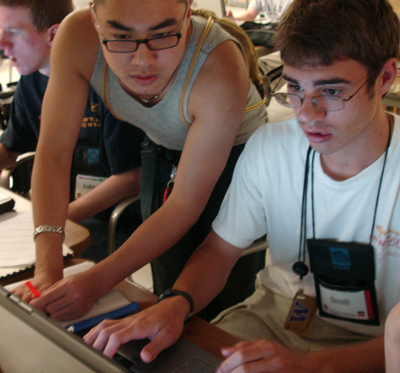About the CBI (AccessComputing: Building Capacity to Promote the Success of Students, Including Veterans, With Disabilities in Computing and Information Technology Fields 2011)

The AccessComputing: Building Capacity to Promote the Success of Students, Including Veterans, with Disabilities in Computing and Information Technology Fields CBI took place May 24-26, 2011 in Arlington, VA. Its overall purpose was to explore ways to increase the participation and success of students, including veterans, with disabilities in computing and information technology postsecondary studies and careers. AccessComputing institutional partners were represented at the event; most came with local teams that included computing/IT faculty, disability services, veterans organizations, and/or local community colleges.
Participants in this two-day event included student services leaders, administrators, and teaching faculty from institutions around the country. Hosted by the UW AccessComputing project, the CBI provided a forum for comparing recruitment and access challenges, sharing successful practices, developing collaborations, and identifying systemic change initiatives for increasing the capacity of institutions to serve students with disabilities. Specific goals of this CBI were to
- gain information about recruiting, serving, and retaining students, including veterans, with disabilities on postsecondary campuses;
- brainstorm ideas for bridging the gap between computing faculty, disability services faculty, community colleges, and veterans services;
- share information about best practices for serving students, including veterans, with disabilities, funding opportunities, and resources; and
- network.
Speakers and panelists were also CBI participants. Many either had disabilities or were practitioners with direct experience in serving students with disabilities. Broad issues that were discussed included
- transitions to post-secondary education;
- recruitment and retention of students, including veterans, with disabilities in postsecondary education; and
- transition to employment after postsecondary graduation.
In this CBI
- all participants contributed to its success;
- experts in all topic areas were in the audience; and
- although some predetermined professional development was presented, new content was delivered as the meeting unfolded and participant interests were expressed and expertise was made known.
The CBI was comprised of panel and individual presentations and working group discussions. Panel discussions offered participants opportunities to discover new ways for campus disability services, computing departments, and various other groups to collaborate to improve the postsecondary experiences of students with disabilities, including veterans. Individual presentations included information on computing and IT career opportunities for students with disabilities and best practices for institutions serving students with disabilities, as well as web accessibility.
Participants in small working groups, responded to the following questions:
- What are your thoughts about specific steps your institution or computing/IT department could take to embrace universal design?
- What kinds of services, supports, and institutional/departmental policies and procedures can be implemented to promote the participation and success of students with disabilities, including veterans, in computing and IT studies and careers?
- How can universal design and accessibility issues with respect to IT be integrated into campus disability and computing services, computing and IT curriculum, and other units?
- What kinds of services, supports, and institutional/departmental changes can be implemented to promote the participation and success of students with disabilities, including veterans, in computing and IT studies and careers?
- What future collaborations and other activities would be beneficial to you as we address the AccessComputing project goal?
- What are some preliminary ideas regarding how disabled student services, computing departments and veterans-serving organizations in your region might work together to increase the participation and success of students with disabilities in computing and IT fields?
The results of the pre-conference surveys sent to participants, agenda for the CBI, summaries of the presentations and panels, and reports from the working group discussions are provided on the following pages.